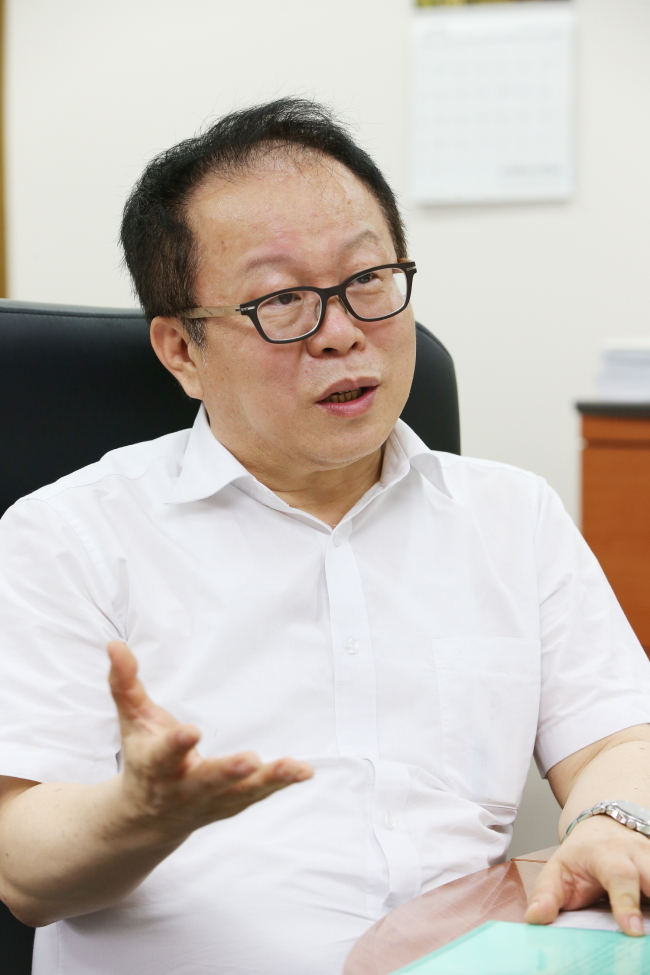Trend is toward interaction, says leading robot developer
By Korea HeraldPublished : Oct. 11, 2013 - 20:31
Robots will be the avant-garde industry of the century, embodying today’s two most in-demand features ― mobility and autonomy ― according to Oh Jun-ho, Korea’s top robotics scientist.
“People now demand physical interaction in their everyday machines. Game systems like Wii therefore accrued much popularity… People also want independent thinking abilities in their things. Look at Google; you type in a few letters and the system answers by coming up with a list of potential items the user may be looking for,” the KAIST professor famous for his development of the humanoid Albert Hubo in the mid-2000s told The Korea Herald in a interview.
“People now demand physical interaction in their everyday machines. Game systems like Wii therefore accrued much popularity… People also want independent thinking abilities in their things. Look at Google; you type in a few letters and the system answers by coming up with a list of potential items the user may be looking for,” the KAIST professor famous for his development of the humanoid Albert Hubo in the mid-2000s told The Korea Herald in a interview.

Hence, he concluded, service robots such as robot vacuum cleaners, entertainment robots, and education robots will command a much larger market in the future.
“This is why the robot industry is clearly the upcoming trend.”
Oh cautioned robot industry watchers, however, that creating quasi-human machines capable of emotional interaction would be difficult, if not outright impossible, in the foreseeable future.
“Because we can’t give robots, no matter the level of technological sophistication, what every human being inherently has ― human souls.”
Just like computers, robots’ capabilities can be measured by the amount of memory they can store within their systems, and by how fast they implement calculations. A robot vacuum cleaner, for example, will be able to move faster across the room and wipe in more dust as research improves related technologies. But encountering robots that are able to feel sad, happy, and otherwise be emotional such as C-3PO or R2-D2 from Star Wars, will not be possible.
“Some researchers argue that as technology becomes more developed, larger memory spaces and faster calculating abilities will enable robots to eventually feel and think, instead of simply taking orders.”
Oh also touched on the ethical problems surrounding the robotics industry, particularly those on the usage of military robots in bombing missions using unmanned aerial vehicles and the security droids in use along the Demilitarized Zone.
“When machines, or robots in this case, gain more and more strength, and even killing powers, we as humans can, and most likely will, take away their abilities to think independently. By doing that we make them subject to human orders.”
This will obviously not shoo away all the worries against defense industry robotics, but Oh said that robots would not turn into irresponsible killer zombies.
The United States, Japan, the EU, and South Korea are currently at the cutting edge of robot technology. American, Japanese, and European engineers however are still the leaders of the field, with South Korean developers barely catching-up with their competitors in the last 10 years.
Oh called for more fundamental robotics research to take place in order to narrow the gap. “R&D cannot be limited to truly attain something. Scientists must start building robots even if there is no current market for the projected models,” he said.
“Why not start making snake robots, or centipede droids, or three-legged robots?”
By Jeong Hunny (hj257@heraldcorp.com)
“This is why the robot industry is clearly the upcoming trend.”
Oh cautioned robot industry watchers, however, that creating quasi-human machines capable of emotional interaction would be difficult, if not outright impossible, in the foreseeable future.
“Because we can’t give robots, no matter the level of technological sophistication, what every human being inherently has ― human souls.”
Just like computers, robots’ capabilities can be measured by the amount of memory they can store within their systems, and by how fast they implement calculations. A robot vacuum cleaner, for example, will be able to move faster across the room and wipe in more dust as research improves related technologies. But encountering robots that are able to feel sad, happy, and otherwise be emotional such as C-3PO or R2-D2 from Star Wars, will not be possible.
“Some researchers argue that as technology becomes more developed, larger memory spaces and faster calculating abilities will enable robots to eventually feel and think, instead of simply taking orders.”
Oh also touched on the ethical problems surrounding the robotics industry, particularly those on the usage of military robots in bombing missions using unmanned aerial vehicles and the security droids in use along the Demilitarized Zone.
“When machines, or robots in this case, gain more and more strength, and even killing powers, we as humans can, and most likely will, take away their abilities to think independently. By doing that we make them subject to human orders.”
This will obviously not shoo away all the worries against defense industry robotics, but Oh said that robots would not turn into irresponsible killer zombies.
The United States, Japan, the EU, and South Korea are currently at the cutting edge of robot technology. American, Japanese, and European engineers however are still the leaders of the field, with South Korean developers barely catching-up with their competitors in the last 10 years.
Oh called for more fundamental robotics research to take place in order to narrow the gap. “R&D cannot be limited to truly attain something. Scientists must start building robots even if there is no current market for the projected models,” he said.
“Why not start making snake robots, or centipede droids, or three-legged robots?”
By Jeong Hunny (hj257@heraldcorp.com)
-
Articles by Korea Herald



![[AtoZ Korean Mind] Does your job define who you are? Should it?](http://res.heraldm.com/phpwas/restmb_idxmake.php?idx=644&simg=/content/image/2024/05/06/20240506050099_0.jpg&u=)















![[Today’s K-pop] Seventeen tops Oricon chart with best-of album](http://res.heraldm.com/phpwas/restmb_idxmake.php?idx=642&simg=/content/image/2024/05/07/20240507050676_0.jpg&u=)